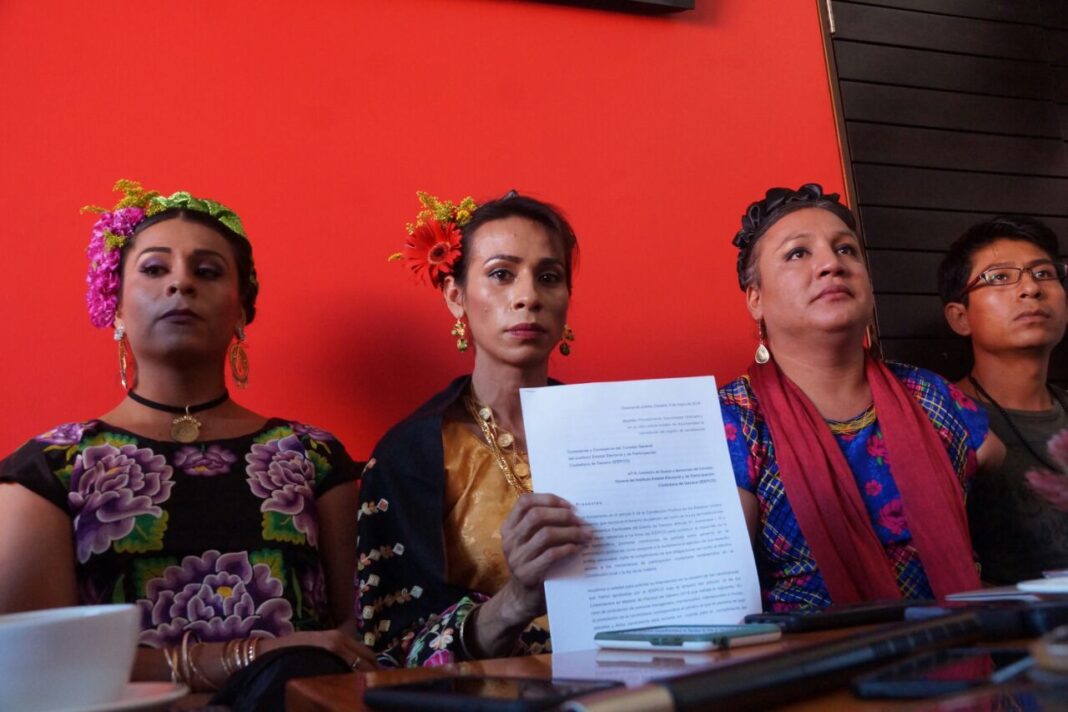In Mexico, even trans candidacies are stolen: six cisgender men govern municipalities in Michoacán after usurping positions meant for trans women.
Denied Rights in Latin America
In a country where the life expectancy of a trans person is just 35 years, politics has become a new battleground. Mexico, the second-deadliest country for trans people in the world after Brazil, is facing a crisis of representation that goes beyond statistics: six cisgender men currently govern municipalities in Michoacán after usurping candidacies reserved for trans women.
One of them is Apolonio Ureña, mayor of Tumbiscatío, sanctioned by the Electoral Court of Michoacán for appropriating a trans candidacy. Ureña, a cisgender, heterosexual, and married man, is part of a pattern seen in the 2024 elections: men taking advantage of a self-identification process with no safeguards, seizing spaces meant for historically marginalized populations.
Read: Underground but not alone: the networks defying the abortion ban in Querétaro
The decision by the Electoral Tribunal of the Federal Judiciary to prioritize the right to privacy over verifying a life consistent with the declared gender left most of the impostors unpunished. Only three of them were sanctioned, while the others remain in office.
Trans candidacies: A quota mocked
“They gave us a list with 96 people registered as trans women. When we started reviewing it, we realized they were cisgender men,” denounces Renata Medina from Pride Michoacán. She helped build the State Observatory of Political-Electoral Rights, which had already raised alarms about simulated candidacies in past elections.
Ironically, 31 of these impersonation cases came from traditionally conservative parties like PAN, PRI, and PES. Some candidates even mocked the issue: “Well, I feel like a woman, go ahead and tell me I’m not,” activists report hearing during interviews with the alleged trans candidates.
Ver esta publicación en Instagram
A struggle with a face
The stolen representation stands in contrast to the stories of trans women who have fought for decades to reach decision-making spaces. Like Salma Luévano, federal deputy and head of the Inclusive Economy Unit at the Ministry of Economy.
“Proudly, I say I am the mother of the rainbow quotas,” says Salma, one of the first trans legislators in the Mexican Congress. She arrived in San Lázaro in 2021 representing a country where, she says, she often faced rejection for being trans, a sex worker, and a stylist. But her arrival wasn’t just a personal victory—it symbolized collective progress.
“My first day in Congress I wore a see-through sequin dress and platform shoes. It was my way of saying: we are here. Trans women have finally arrived in Congress,” she recalls.
The other side of inclusion
But inclusion does not always lead to structural change. In Tepito, trans activist Victoria Sámano, founder of Casa LLECA, recalls how institutional abandonment forced her to open her own home during the pandemic to shelter homeless trans women.
Today, her organization offers comprehensive support to LGBT+ people, many of whom are migrants, sex workers, or battling addiction. For Victoria, quotas without political backing are just a facade: “These congresswomen proposed good initiatives, but their parties didn’t support them. Sometimes they are only used so parties appear inclusive,” she says.
Affirmative actions, Sámano points out, are not designed to ensure real participation for the trans population. Often, they benefit cisgender gay men or become a mere simulation.
A flawed system
According to Irene Valdivia, a trans activist in Michoacán, the root of the problem lies in structural gaps: “True spaces for trans people have never been created. There was never a real possibility of voting for an openly trans person, only simulations.”
Read also: Housing in Mexico City: a denied right turned into a privilege for a few
The unchecked use of self-identification has opened the door to manipulation. Valdivia recalls a mayor who registered as a person with a disability because of nearsightedness and astigmatism: “That shows how parties are handing out these positions—no filters, no protocols, no oversight.”
A simulated democracy
INE councilor Norma Irene de la Cruz admits the current system is easy to manipulate. “We must regulate affirmative actions by law in order to enforce them. It’s not about eliminating self-identification, but about establishing reasonable verification mechanisms.”
Experience shows that without real political will, quotas are not enough. In 2024, Mexico faced its deadliest year for trans people: 59 trans women were murdered, according to the National Observatory of Hate Crimes Against LGBT+ People. The need for a comprehensive Trans Law, like those that exist in other countries, has become urgent.
“We’re talking about health, housing, work, education, justice—all in one law. That’s why it’s comprehensive. Because we try to address all the gaps we trans people experience,” says Sámano.
A lingering debt
Today, only five openly LGBTQ+ individuals occupy seats in the Mexican Congress, and one in the Senate. These are symbolic numbers, but far from enough to undo centuries of exclusion. “Legitimate representation is crucial. Because if we’re not at the decision-making table, no one else will bring our issues forward,” insists Luévano.
Political representation isn’t just about numbers—it’s about legitimacy. It’s about restoring the voices of those who’ve been silenced, even in the spaces they fought so hard to win.
As courts wrestle between individual rights and social justice, the trans community continues to demand the most basic thing: not to be robbed—once again—of the opportunity to be seen, heard, and respected.




